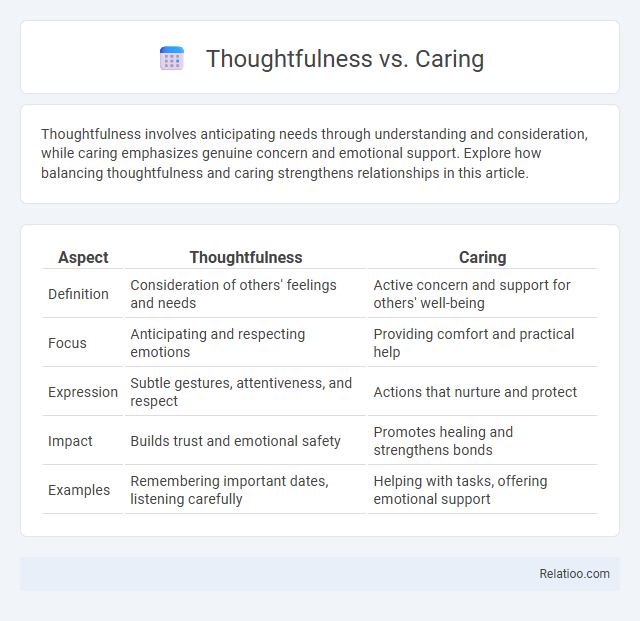Thoughtfulness involves anticipating needs through understanding and consideration, while caring emphasizes genuine concern and emotional support. Explore how balancing thoughtfulness and caring strengthens relationships in this article.
Table of Comparison
| Aspect | Thoughtfulness | Caring |
|---|---|---|
| Definition | Consideration of others' feelings and needs | Active concern and support for others' well-being |
| Focus | Anticipating and respecting emotions | Providing comfort and practical help |
| Expression | Subtle gestures, attentiveness, and respect | Actions that nurture and protect |
| Impact | Builds trust and emotional safety | Promotes healing and strengthens bonds |
| Examples | Remembering important dates, listening carefully | Helping with tasks, offering emotional support |
Understanding Thoughtfulness vs Caring
Understanding thoughtfulness involves recognizing actions driven by consideration and attentiveness to others' needs, while caring encompasses emotional investment and genuine concern for someone's well-being. Thoughtfulness manifests through deliberate gestures or words that convey respect and empathy, whereas caring is broader, reflecting an ongoing emotional commitment. Emphasizing thoughtfulness highlights the importance of mindful behavior as a foundation for demonstrating true caring in relationships.
Defining Thoughtfulness in Everyday Life
Thoughtfulness in everyday life involves a conscious awareness of others' feelings and needs, expressed through intentional actions and considerate behavior. It goes beyond simple caring by incorporating reflection and foresight to anticipate how one's actions affect others. Thoughtfulness creates meaningful connections by blending empathy with practical gestures that enhance social harmony and personal relationships.
What Does It Mean to Truly Care?
Truly caring involves consistent empathy and intentional actions that prioritize another person's well-being beyond surface-level concern. Thoughtfulness reflects this by anticipating needs and showing consideration through meaningful gestures that communicate value and respect. While kindness is a general disposition toward goodwill, genuine care combines emotional investment with proactive support, creating deeper, impactful connections.
Key Differences Between Thoughtfulness and Caring
Thoughtfulness involves being mindful of others' needs and feelings through considerate actions, while caring reflects a deeper emotional concern and genuine affection for someone's well-being. Thoughtfulness can be demonstrated through small gestures like remembering important dates or offering help, whereas caring often motivates sustained support and empathy during challenging times. Your understanding of these key differences enhances meaningful relationships by balancing both considerate behavior and heartfelt concern.
Overlapping Qualities of Thoughtfulness and Caring
Thoughtfulness and caring both center on attentiveness to others' needs and emotions, creating a foundation of empathy and consideration in relationships. They share qualities such as active listening, anticipating needs, and demonstrating kindness through small, meaningful actions. This overlap fosters trust and strengthens social bonds by showing genuine concern for others' well-being.
How Thoughtfulness Manifests in Relationships
Thoughtfulness in relationships manifests through genuine attention to Your partner's needs, anticipating concerns, and proactively offering support without being asked. It reflects in small, meaningful gestures that show you value their feelings and experiences, creating a deeper emotional connection. Unlike general caring, thoughtfulness involves intentional actions that demonstrate empathy and consideration consistently over time.
The Impact of Genuine Caring on Well-being
Genuine caring significantly enhances well-being by fostering emotional security, reducing stress, and promoting positive social connections, which contributes to improved mental health. Thoughtfulness involves mindful attention to others' needs, helping to create meaningful interactions that reinforce trust and empathy. The interplay of thoughtfulness and caring cultivates a supportive environment where individuals experience increased happiness, resilience, and overall life satisfaction.
Cultivating Thoughtfulness and Caring Habits
Cultivating thoughtfulness involves developing mindfulness and empathy to anticipate others' needs, while caring habits emphasize consistent actions that demonstrate genuine concern and support. Thoughtfulness encourages reflective consideration of others' feelings, fostering deeper interpersonal connections through attentive listening and meaningful gestures. Building these habits requires intentional practice in both recognizing emotional cues and responding with kindness to nurture trust and relational well-being.
Common Misconceptions About Caring and Thoughtfulness
Common misconceptions about caring and thoughtfulness often confuse the two as being synonymous, yet they represent distinct emotional expressions; caring involves genuine concern for others' well-being, while thoughtfulness emphasizes deliberate acts that show consideration. Many people mistakenly believe that simply feeling caring emotions is sufficient, but without thoughtful actions, those feelings may not effectively communicate support or kindness. Your ability to differentiate and practice both caring and thoughtfulness enhances meaningful connections and fosters deeper empathy in relationships.
Choosing Between Thoughtfulness and Caring in Difficult Situations
Choosing between thoughtfulness and caring in difficult situations requires understanding that thoughtfulness involves anticipating needs and acting with foresight, while caring centers on emotional support and empathy. Your ability to balance thoughtful actions with genuine caring can lead to more effective problem-solving and deeper connections. Prioritizing thoughtfulness ensures practical solutions, whereas emphasizing caring strengthens emotional bonds during challenging times.

Infographic: Thoughtfulness vs Caring
 relatioo.com
relatioo.com